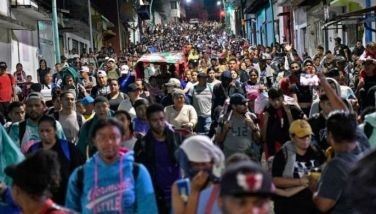Egypt elects new parliament, first under el-Sissi
CAIRO — Egyptian voters head to the polls Sunday to elect a parliament, the first since the military-led ouster of Islamist President Mohammed Morsi in 2013.
The vote will mark the final step in what has been billed as a post-Morsi transition to democracy. But critics here and abroad describe it as part of a rolling retrenchment of authoritarian rule nearly five years after long-serving autocrat Hosni Mubarak was toppled by a 2011 pro-democracy uprising.
Political parties — those that are eligible to run — are weak with little popular following. They are hurt even more by the law governing how the election will be run. And there is a general societal atmosphere strongly against public criticism of the government, with many Egyptians seeking stability after years of turmoil that have devastated the economy.
THE SYSTEM
The elections law designates three categories of seats in the 596-seat House of Representatives: those elected through a party list (120 seats or 20 percent), those elected individually (448 seats or 75 percent), and those appointed by the president (28 seats or 5 percent).
Political parties are heavily disadvantaged by an election law, passed by presidential decree last year. The party list that wins an absolute majority will take all the seats in each district, making it harder for small parties to secure seats.
The law also uses the list system to fill quotas of underrepresented minorities. Each 15-candidate party list must include three Christians, two workers or farmers, two youth candidates, a disabled person, and an Egyptian residing abroad. Seven of the 15 candidates must be women.
A full 75 percent of the assembly is reserved for candidates running as individuals, races in which prominent, wealthy local government-affiliated power brokers have a presumed advantage. Moreover, individuals can form a slate and run against parties for the list seats.
The government's supporters reject the criticism from opposition political parties, insisting the field is wide open for anyone who wants to compete. Egypt's President Abdel-Fattah el-Sissi is not a member of any party and portrays himself as being above the political fray.
Another 5 percent of the parliament will be appointed by the president, a measure meant to ensure seats for underrepresented minorities.
THE DATES
Egypt's election will take place in two phases.
Phase one includes the governorates of Giza, Fayoum, Beni Suef, Minya, Assiut, Wadi el-Gedid, Sohag, Qena, Luxor, Aswan, Red Sea, Alexandria, Beheira and Marsa Matrouh. Elections will be held October 18-19, with runoff elections on October 27-28. Results will be announced October 29-30.
Phase two includes the governorates of Cairo, Qalyoubiya, Dakahliya, Menoufiya, Gharbeia, Kafr el-Sheikh, Sharqiya, Damietta, Port Said, Ismailia, Suez, North and South Sinai. Elections will be held November 22-23, with runoff elections on December 1-2. Results will be announced December 3-4.
A total of 54 million Egyptians are eligible to vote in the parliamentary elections, according to government figures.
THE CANDIDATES
The High Electoral Committee said last month that they had accepted the candidacy papers of nine lists and 5,420 individual candidates.
Few candidates have broad recognition or clear platforms, and most have a pro-government bent.
The "For the Love of Egypt" list, put together by a prominent retired army officer, includes former government ministers and high-profile businessmen. It openly supports el-Sissi and is seen as the front-running list.
While the Muslim Brotherhood and its political party have both been banned, ultraconservative Muslims have an option: candidates from the Salafi Al-Nour Party.
Al-Nour won about a quarter of the vote in the country's first post-revolution parliamentary election held in late 2011 and early 2012 — coming behind only the Brotherhood. It later backed the army's overthrow of Morsi in 2013, adding crucial legitimacy to a move decried by most Islamists as a war against political Islam.
Today, Al-Nour argues that it is not a religion-based party — which are banned according to the 2014 constitution — but rather one with a "religious background" that focuses on social priorities such as health insurance and economic development.
THE PARLIAMENT
Egypt's 2014 constitution_arguably the most liberal Egypt has ever had — grants the House of Representatives ample power.
For example, the parliament can withdraw confidence from the president and call for early presidential elections with a request signed by the majority of its members, the approval of 2/3 of its members and the approval of a public referendum. If the president objects to a draft law, the parliament can push it through with a 2/3 majority. The parliament can also alter expenditures listed in the state budget.
However, rather than challenging the power of the president, analysts and activists say the next legislature is likely to be a rubber-stamp body that further solidifies el-Sissi's hold on power.
- Latest
- Trending

































